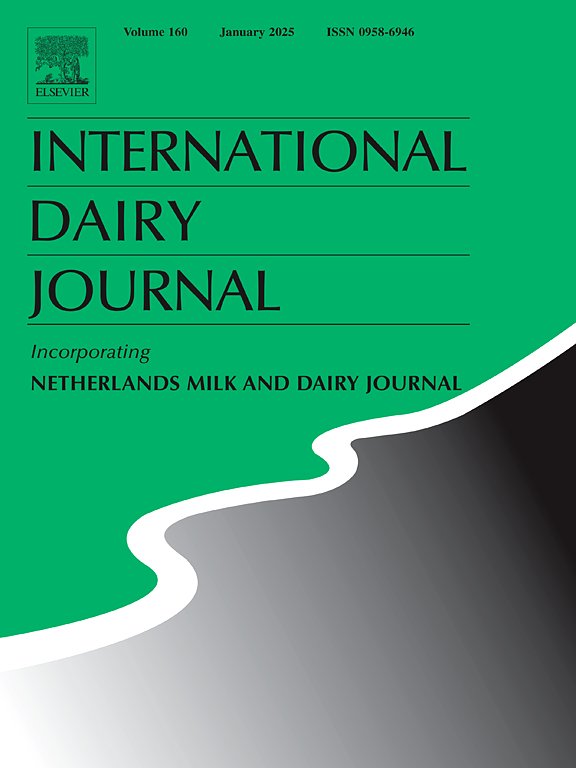不同β-酪蛋白基因型奶牛实验污染乳中κ-酪蛋白对微生物蛋白酶降解的敏感性
IF 3.4
3区 农林科学
Q2 FOOD SCIENCE & TECHNOLOGY
引用次数: 0
摘要
A2牛奶的特性目前还在争论中,关于不同β-酪蛋白基因型奶牛牛奶中微生物蛋白酶作用的信息有限。本研究旨在用蜡样芽孢杆菌和荧光假单胞菌对A1A1、A1A2和A2A2 β-酪蛋白基因型奶牛的牛奶进行实验污染,并在不同孵育时间定量CMP,以确定这三种基因型是否影响微生物对κ-CN的降解。无论基因型或治疗方式如何,游离CMP浓度随时间增加。A1A1基因型表现出较低的κ-CN降解率和较低的游离CMP浓度。荧光假单胞菌对κ-CN的降解速度比蜡样芽孢杆菌慢。这些结果表明,基因型对A2乳中κ-CN的微生物降解有影响,表明A2乳虽然消化率提高,但可能更容易被微生物蛋白酶降解。本文章由计算机程序翻译,如有差异,请以英文原文为准。
Susceptibility of κ-Casein to degradation by microbial proteases in experimentally contaminated milk from cows with different β-Casein genotypes
The properties of A2 milk are currently under debate, with limited information available on the action of microbial proteases in milk from cows with different β-casein genotypes. The study aimed to experimentally contaminate milk from cows with A1A1, A1A2, and A2A2 β-casein genotypes with Bacillus cereus s.s. and Pseudomonas fluorescens and to quantify CMP at different incubation times in order to determine whether the three genotypes influence the microbial degradation of κ-CN. There was an increase in the concentration of free CMP over time, regardless of genotype or treatment. The A1A1 genotype showed a lower rate of κ-CN degradation and a lower concentration of free CMP. The degradation by Pseudomonas fluorescens was slower than that by Bacillus cereus s.s. These results demonstrate the influence of genotypes on the microbial degradation of κ-CN, suggesting that A2 milk, despite its enhanced digestibility, may be more susceptible to degradation by microbial proteases.
求助全文
通过发布文献求助,成功后即可免费获取论文全文。
去求助
来源期刊

International Dairy Journal
工程技术-食品科技
CiteScore
6.50
自引率
9.70%
发文量
200
审稿时长
49 days
期刊介绍:
The International Dairy Journal publishes significant advancements in dairy science and technology in the form of research articles and critical reviews that are of relevance to the broader international dairy community. Within this scope, research on the science and technology of milk and dairy products and the nutritional and health aspects of dairy foods are included; the journal pays particular attention to applied research and its interface with the dairy industry.
The journal''s coverage includes the following, where directly applicable to dairy science and technology:
• Chemistry and physico-chemical properties of milk constituents
• Microbiology, food safety, enzymology, biotechnology
• Processing and engineering
• Emulsion science, food structure, and texture
• Raw material quality and effect on relevant products
• Flavour and off-flavour development
• Technological functionality and applications of dairy ingredients
• Sensory and consumer sciences
• Nutrition and substantiation of human health implications of milk components or dairy products
International Dairy Journal does not publish papers related to milk production, animal health and other aspects of on-farm milk production unless there is a clear relationship to dairy technology, human health or final product quality.
 求助内容:
求助内容: 应助结果提醒方式:
应助结果提醒方式:


